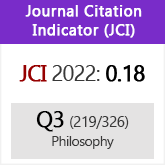El estado de la virtud. Sobre la noción de tolerancia en el liberalismo político de John Rawls
DOI:
https://doi.org/10.3989/isegoria.2004.i31.454Abstract
This paper approaches the idea of toleration in John Rawls political liberalism. In particular, it is the general theory what is considered, not the application of it to international relations. Enlightening that idea requires to discuss the different meanings of «toleration» as can be distinguish in Rawls liberalism: On the one hand, Rawls relies that those people for whom the political conception of justice is chosen will have the virtue of toleration. This bargaining for that virtue carries citizens duties, as the duty to be reasonable, recognizing the burdens of reason or the duty of civility; obligations that will be briefly examined. On the other hand, toleration appears as a principle of legitimacy in Rawls political liberalism: as a principle that gives us reasons which justify the ends and organization of the basic structure of society. Then, virtue and principle of toleration are complementary but also maintain strained relations. In view of the hierarchy of values that virtue of toleration presupposes, it does not fit appraising that virtue as a basic political one where the principle of toleration rules the foundations of socio-political order.
Downloads
Download data is not yet available.
Downloads
Published
2004-12-30
How to Cite
Escámez Navas, S. (2004). El estado de la virtud. Sobre la noción de tolerancia en el liberalismo político de John Rawls. Isegoría, (31), 47–78. https://doi.org/10.3989/isegoria.2004.i31.454
Issue
Section
Articles
License
Copyright (c) 2004 Consejo Superior de Investigaciones Científicas (CSIC)

This work is licensed under a Creative Commons Attribution 4.0 International License.
© CSIC. Manuscripts published in both the printed and online versions of this Journal are the property of Consejo Superior de Investigaciones Científicas, and quoting this source is a requirement for any partial or full reproduction.All contents of this electronic edition, except where otherwise noted, are distributed under a “Creative Commons Attribution 4.0 International” (CC BY 4.0) License. You may read here the basic information and the legal text of the license. The indication of the CC BY 4.0 License must be expressly stated in this way when necessary.
Self-archiving in repositories, personal webpages or similar, of any version other than the published by the Editor, is not allowed.














